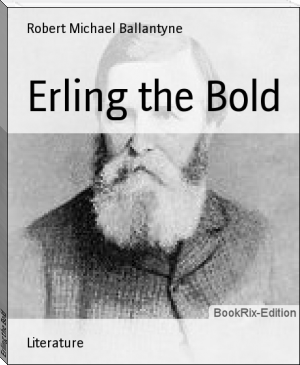Erling the Bold by R. M. Ballantyne (distant reading .txt) 📗

- Author: R. M. Ballantyne
Book online «Erling the Bold by R. M. Ballantyne (distant reading .txt) 📗». Author R. M. Ballantyne
Ulf’s men were, nevertheless, good stout fellows, and they fought valiantly; but it so happened that the wing of the enemy to which they were opposed was commanded by Skarpedin, of whom it was said that he was equal to any six men. In spite, therefore, of the courage and the strength of Ulf and Glumm, the Northmen in that part of the field began slowly to give back. Ulf and Glumm were so maddened at this that they called their men cowards, and resolved to go forward till they should fall. Uttering their war-cry, they made a desperate charge, hewing down men like stalks of corn; but although this caused the Danes to give way a little, they could not advance, not being well backed, but stood fighting, and merely kept their ground.
Now it had chanced shortly before this, that Haldor stayed his hand and drew back with Erling. They went out from the front of the fight, and observed the left wing giving way.
“Come, let us aid them,” cried Haldor.
Saying this he ran to the left wing, with Erling by his side. They two uttered a war-cry that rose high above the din of battle like a roar of thunder, and, rushing to the front, fell upon the foe. Their gilt helmets rose above the crowd, and their ponderous axes went swinging round their heads, continually crashing down on the skulls of the Danes. With four such men as Haldor, Erling, Ulf and Glumm in front, the left wing soon regained its lost ground and drove back the Danes. Nothing could withstand the shock. Skarpedin saw what had occurred, and immediately hastened to the spot where Haldor stood, sweeping down all who stood in his way.
“I have been searching for thee, Erling,” he cried, going up to Haldor, and launching a javelin.
Haldor caught it on his shield, which it pierced through, but did him no hurt.
“Mistaken thou art, but thou hast found me now,” cried Erling, thrusting his father aside and leaping upon the Dane.
Skarpedin changed his bill to his left hand, drew his sword, and made such a blow at his adversary, that the point cut right through his shield. With a quick turn of the shield, Erling broke the sword short off at the hilt. Skarpedin seized his bill and thrust so fiercely that it also went through the shield and stuck fast. Erling forced the lower end or point of his shield down into the earth, and so held it fast, dropped his axe, drew his sword, and made it flash so quick round his head that no one could see the blade. It fell upon Skarpedin’s neck and gave him a grievous wound, cutting right through his armour and deep into his shoulder blade.
A great cry arose at this. The Danes made a rush towards their chief, and succeeded in dragging him out of the fight. They put him on his shield and bore him off to his ship, which was launched immediately. This was the turning-point in the day. Everywhere the Danes fled to their ships pursued by the victors. Some managed to launch their vessels, others were not so fortunate, and many fell fighting, while a few were taken prisoners.
Foreseeing that this would be the result, Haldor and Erling called off their men, hastened on board their ships, and gave chase, while the rest of the force looked after the prisoners and the booty, and dressed their own and their comrades’ wounds.
“A bloody day this,” said Ulf to Guttorm, as the latter came up, wiping the blade of his sword.
“I have seen worse,” observed the old warrior, carefully returning his weapon to its scabbard.
“The Danes will long remember it,” observed Glumm. “The ravens will have a good feast to-night.”
“And Odin’s halls a few more tenants,” said Guttorm:
“The Danes came here all filled with greed,
And left their flesh the crows to feed.
“But what is to be done with these?” he added, pointing to the prisoners, about twenty of whom were seated on a log with their feet tied together by a long rope, while their hands were loose.
“Kill them, I suppose,” said Ulf.
There were thirty men seated there, and although they heard the words, they did not show by a single glance that they feared to meet their doom.
Just then Swart of the Springs came up. He had a great axe in his hands, and was very furious.
“Thou hast killed and burned my wife, children, and homestede,” he said fiercely, addressing the prisoner who sat at the end of the log, “but thou shalt never return to Denmark to tell it.”
He cut at him with the axe as he spoke, and the man fell dead. One after another Swart killed them. There was one who looked up and said—
“I will stick this fish bone that I have in my hand into the earth, if it be so that I know anything after my head is cut off.”
His head was immediately cut off, but the fish bone fell from his hand.
Beside him there sat a very handsome young man with long hair, who twisted his hair over his head, stretched out his neck, and said, “Don’t make my hair bloody.”
A man took the hair in his hands and held it fast. Then Swart hewed with his axe, but the Dane twitched his head back so strongly, that he who was holding his hair fell forward; the axe cut off both his hands, and stuck fast in the earth.
“Who is that handsome man?” asked Ulf.
The man replied with look of scorn, “I am Einar, the son of King Thorkel of Denmark; and know thou for a certainty that many shall fall to avenge my death.”
Ulf said, “Art thou certainly Thorkel’s son? Wilt thou now take thy life and peace?”
“That depends,” replied the Dane, “upon who it is that offers it.”
“He offers who has the power to give it—Ulf of Romsdal.”
“I will take it,” says he, “from Ulf’s hands.”
Upon that the rope was loosed from his feet, but Swart, whose vengeance was still unsatisfied, exclaimed—
“Although thou shouldst give all these men life and peace, King Ulf, yet will I not suffer Einar to depart from this place with life.”
So saying he ran at him with uplifted axe, but one of the viking prisoners threw himself before Swart’s feet, so that he tumbled over him, and the axe fell at the feet of a viking named Gills. Gills caught the axe and gave Swart his death-wound.
Then said Ulf, “Gills, wilt thou accept life?”
“That will I,” said he, “if thou wilt give it to all of us.”
“Loose them from the rope,” said Ulf.
This was done, and the men were set free.
Eighteen of the Danish vikings were killed, and twelve got their lives upon that occasion.
While the fight at the Springs which we have just described was going on, Christian the hermit sat in the hall at Ulfstede conversing with Hilda and Dame Astrid, and some of the other women. All the fighting men of the place had been taken away—only one or two old men and Alric were left behind—for Ulf, in his impetuosity, had forgotten to leave a guard at home.
“I hope it will fare well with our men at the Springs,” said Hilda, looking up with an anxious expression from the mantle with which her nimble fingers were busy.
“I hope so too,” said Christian, “though I would rather that there had been no occasion to fight.”
“No occasion to fight!” exclaimed Alric, who was dressing the feathers on an arrow which he had made to replace the one he lost in shooting at the Dane,—and the losing of which, by the way, he was particularly careful to bring to remembrance as often as opportunity offered—sometimes whether opportunity offered or not. “No occasion to fight! What would be the use of weapons if there were no fighting! Where should we get our plunder if there were no fighting, and our slaves? why, what would Northmen find to do if there were no fighting?”
The hermit almost laughed at the impetuosity of the boy as he replied—
“It would take a wiser head than mine, lad, to answer all these questions, more particularly to answer them to thy satisfaction. Notwithstanding, it remains true that peace is better than war.”
“That may be so,” said Dame Astrid; “but it seems to me that war is necessary, and what is necessary must be right.”
“I agree with that,” said Ada, with a toss of her pretty head—for it would seem that that method of expressing contempt for an adversary’s opinion was known to womankind at least a thousand years ago, if not longer. “But thou dost not fight, Christian: what has war done to thee that thou shouldst object to it so?”
“What has war done for me?” exclaimed the old man, springing up with sudden excitement, and clasping his lean hands tight together; “has it not done all that it could do? Woman, it has robbed me of all that makes life sweet, and left me only what I did not want. It has robbed me of wife and children, and left a burdened life. Yet no—I sin in speaking thus. Life was left because there was something worth living for; something still to be done: the truth of God to be proclaimed; the good of man to be compassed. But sometimes I forget this when the past flashes upon me, and I forget that it is my duty as well as my joy to say, ‘The Lord gave, and the Lord hath taken away; blessed be the name of the Lord.’”
The old man sat down again, and leaned his brow on his hand. The women, although sympathetic, were puzzled by some of his remarks, and therefore sat in silence for a little, but presently the volatile Ada looked up and said—
“What thinkest thou, Hilda, in regard to war?”
“I know not what to think,” replied Hilda.
“Nay, then, thy spirit must be flying from thee, for thou wert not wont to be without an opinion on most things. Why, even Erling’s sister, Ingeborg, has made up her mind about war I doubt not, though she is too modest to express it.”
Now this was a sly hit at Ingeborg, who was sitting by, for she was well known to have a shrewish temper, and to be self-willed and opinionated, in so much that most men kept out of her way. She was very unlike Erling, or her father and mother, or her little sisters, in this respect.
“I can express my opinion well enough when I have a mind,” said Ingeborg sharply; “and as to war, it stands to reason that a Sea-king’s daughter must approve of a Sea-king’s business. Why, the beautiful cloths, and gold and jewels, that are so plentiful in the dale, would never have delighted our eyes if our men had not gone on viking cruise, and fallen in with those rich traders from the far south lands. Besides, war makes our men brisk and handsome.”
“Aye,” exclaimed Alric, laughing, “especially when they get their noses cut off and their cheeks gashed!”
“Sometimes it takes them from us altogether,” observed a poor woman of the household, the widow of a man who





Comments (0)